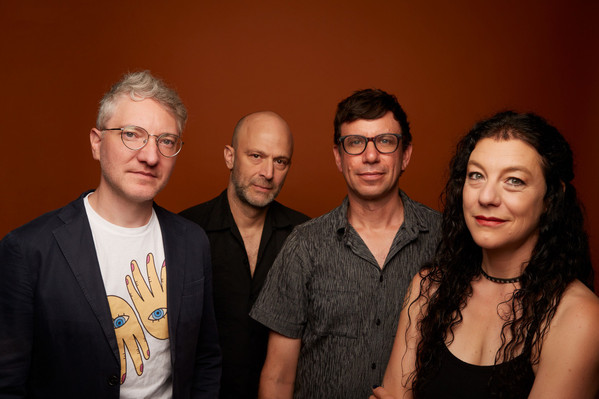


NEWS:
11 shows for December including a new DJ - plus 2025 Festive 50 arriving from Christmas day.
Artist Info
|
Black Ox Orkestar  Image from Discogs  Black Ox Orkestar began in the summer of 2000, the project of four Montreal, Canada musicians exploring their common Jewish heritage for sounds that could speak to them today. Listening to pre-war recordings of Jewish and non-Jewish music from Eastern Europe and the Balkans, they wanted to capture the rawness and emotional intensity they heard there. They also threw their own musical histories into the mix, their years of playing out-jazz, punk rock, or weird folk, creating not so much a fusion of old and new as a way to tear the old sounds from the past and make them resonate in the present. The band tried to be true to the strangeness and beauty of these archaic songs, translating them into new forms, and writing new material that continued an imaginary tradition still humming in their ears. They played their final show in 2005. Black Ox Orkestar began in the summer of 2000, the project of four Montreal, Canada musicians exploring their common Jewish heritage for sounds that could speak to them today. Listening to pre-war recordings of Jewish and non-Jewish music from Eastern Europe and the Balkans, they wanted to capture the rawness and emotional intensity they heard there. They also threw their own musical histories into the mix, their years of playing out-jazz, punk rock, or weird folk, creating not so much a fusion of old and new as a way to tear the old sounds from the past and make them resonate in the present. The band tried to be true to the strangeness and beauty of these archaic songs, translating them into new forms, and writing new material that continued an imaginary tradition still humming in their ears. They played their final show in 2005.On Yiddish The Yiddish language has always been at the center of the project. A unique mixture of German, Hebrew, and Slavic elements, it was the everyday speech of Eastern European Jews for centuries. The voice of the Jewish political and artistic radicalism of the 19th and early 20th centuries was uttered in Yiddish. Suffragettes, sweatshop activists, anarchists and modernist poets all participated in a global, cosmopolitan culture that followed the exodus of Jews from Eastern Europe. This flowering of modern Yiddish was cut short by the Shoah and by the emergence of the state of Israel, which enshrined Hebrew as a national Jewish language. Yiddish was all but pronounced dead when an unexpected revival of its literature and music began to take shape in the 1970s. Why They Sing The ongoing revival of Yiddish culture has opened up a space for a new Jewish radicalism which explores the variation and hybridity of Jewish life in the diaspora, while questioning the defining centrality of Israel. Black Ox celebrates Yiddish diasporic art as a living alternative to state culture in every form. They use Yiddish as a code meant for deciphering, a message from the recent past that cautions against the separation of peoples. As a hybrid tongue, Yiddish has never stood for disengagement and enclosure; it has always thrived on contact and exchange. New Jewish Music By creating original song-settings for Jewish folk ballads (which traditionally were sung a cappella), by writing and performing new, politically-charged Yiddish texts, and by borrowing freely from traditional and contemporary musical sources, Yiddish and otherwise, Black Ox Orkestar hopes to challenge the artistic and political orthodoxies that would try to define the meaning of ìnew Jewish music. The Players Thierry Amar (contrabass) is a member of Godspeed You! Black Emperor and A Silver Mt. Zion. He has contributed to countless recordings and live musical projects in Montreal, figures prominently in the jazz and improv scene, and currently studies with Jacques Beaudoin of the Montreal Symphony Orchestra. He co-founded the Hotel2Tango recording studio, where he works as a recording engineer. Scott Levine Gilmore (vocals, cymbalom, guitar, mandolin, saz, violin & percussion) studied Yiddish Literature at McGill University in Montreal. He played for a brief period in A Silver Mt. Zion (circa Horses In The Sky) and was a founding member of Le Petit Theatre de l’Absolu, a puppet theatre that toured a children’s show through Israel and the occupied West Bank in the fall of 2003. Scott is currently studying law in Washington DC. Gabriel Levine (clarinet, guitar) played in Montreal groups Sackville, Friends of Cush (with Sam Shalabi) and the Wild Lawns. He has worked in Vermont for the Bread and Puppet Theatre, and was a co-founder of Le Petit Theatre de l'Absolu. He is currently finishing a post-graduate degree in Social and Political Thought at Toronto's York University. Jessica Moss (violin) has been playing her instrument since she was five. Breaking with her classical training early on to seek out more exciting and innovative ensembles and genres, she has been a part of many bands and collaborations in Montreal, and has been a guest player on numerous records in Montreal and Toronto. She plays in A Silver Mt. Zion, creates illuminated boxes, and makes soundtracks for film. Read more on Last.fm. User-contributed text is available under the Creative Commons By-SA License; additional terms may apply. Artist biography from last.fm Some other places to look for information: last.fm Discogs MusicBrainz |
